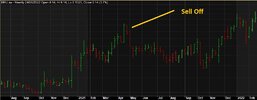- Joined
- 28 December 2013
- Posts
- 6,392
- Reactions
- 24,319
Brought & bought are two words that are often confused, both in pronunciation & spelling. I understand your confusion as the error is on my end for not proofreading. I should have used bought as it implies an economic transaction whereas brought means transporting something.I’m missing the point here—brought bought ?
Skate.


 But devil is always in the detail when it comes to system trading and you can't put that into a few words. Folks who don't have an attention span to read my posts probably shouldn't be thinking about system trading anyway
But devil is always in the detail when it comes to system trading and you can't put that into a few words. Folks who don't have an attention span to read my posts probably shouldn't be thinking about system trading anyway 
